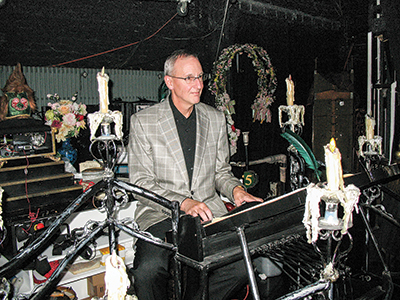A lifelong love of learning
Gary Wendlandt

Catch up with Gary Wendlandt these days, and chances are you'll find him sailing in the Gulf of Mexico, strolling the streets of Paris or even relishing a moment in the spotlight on a Broadway stage. Wendlandt can attest to the joys of retirement following a successful career. And he traces much of his good fortune back to his undergraduate days at Washington University.
Wendlandt retired at the end of 2010 as vice chairman of the board and chief investment officer of New York Life Insurance Co., where he was overseeing more than $260 billion in investments. Although his was not a traditional career for a graduate from the School of Engineering & Applied Science, Wendlandt attributes his preparedness and agility to the education and experience he received in St. Louis.

"Washington University is a place where so many people love what they do and love learning, and if you embrace that, you will be much more successful no matter what you do," he says.
Wendlandt's interest in math and science was sparked at an early age. By the time he graduated from public high school in his hometown of Milwaukee, he figured he would train to be an engineer. It was 1968, and the University of Wisconsin campus was a hot spot for civil disobedience and protests surrounding the Vietnam War. So Wendlandt explored alternatives not too far from home and chose Washington University, where his father had taken classes as a young Army engineer.
He started out as a chemical engineering major but quickly gravitated toward applied mathematics, fascinated by the study of probability, statistics and mathematical operations.
"Every course I took was a revelation," Wendlandt says. "All of the professors I came in contact with were completely in love with what they did."
The late Gustav Mesmer, a former professor of applied mechanics, was one such example.
"He had such great enthusiasm for something most people would find extremely dull," Wendlandt says, "and he conveyed that love in such a way that helped solidify my lifelong interest in learning."
As Wendlandt approached graduation, his roommate's father, also a WashU alumnus, suggested Wendlandt go to work as an actuary at his company, Massachusetts Mutual Life Insurance Co. That led to Wendlandt's first job and set him on a career path in the insurance and financial industry.

"Actuaries are the problem solvers, the engineers of insurance companies," Wendlandt says. "You get into things like underwriting and compensation, mortality, and interest theory — all the business that goes into making an insurance policy."
Wendlandt excelled, earned membership in the American Academy of Actuaries and the Society of Actuaries and assumed roles of increasing responsibility. In 1980, as the insurance industry scrambled to adapt to soaring interest rates, Wendlandt was tapped as the first actuary at MassMutual to join the firm's investment department to solve new problems. Three years later, he took charge as the company's head of securities investments, something unheard of for an actuary at the time.
"The investment side was as interesting as anything else I had done and maybe more," Wendlandt says. "You never come across the same problem twice. I learned how to solve problems in an organized, systematic fashion, while most people operated from emotions. That was in large part due to my training as an engineer. I was taught to develop skills of discipline, organization and problem- solving that are important in any field."
Over the next three decades, Wendlandt grew with MassMutual, eventually serving as chief investment officer before moving to New York Life Insurance Co., the largest mutual life insurance company in the U.S. and a Fortune 100 company, to create and lead that firm's investment activities through New York Life Investment Management LLC. He was credited by the company's chairman with steering the company's investment portfolio wisely through the 2007 and 2008 Great Recession. The "quality tilt" strategy that he used to adjust an investment portfolio to market conditions is now used as a case study in Harvard Business Review.
Wendlandt was elected to the university's Board of Trustees May 6, and in recognition of his professional achievements, WashU's School of Engineering & Applied Science bestowed its Alumni Achievement Award on Wendlandt in 2006.
Now retired, Wendlandt is taking time for fun away from the rigors of the corporate world. He splits his time between New York City and Marco Island, Fla., and takes several weeks a year to travel, sail, visit his five grandchildren, play the piano and attend the theater. Through charity auctions to support the Actors' Equity Association, Wendlandt once conducted the exit music for "The Phantom of the Opera" on Broadway. He took the stage in March as an extra in a performance of "Jersey Boys."
"I was taught to develop skills of discipline, organization and problem-solving that are important in any field."
— Gary Wendlandt
But he remains dedicated to service as well. Wendlandt is a long-standing member of the Boy Scouts of America's National Executive Board, where he has overseen its investment portfolio for more than 30 years. The organization gave him the Silver Buffalo Award, scouting's highest commendation for distinguished service to youth, in 2007.
Wendlandt also sits on the WashU Engineering school's National Council and shares his good fortune with future engineering graduates. He and his wife, Peg, have pledged an estate gift of more than $5 million in scholarships in what is the largest non-facility gift in the school's history. They also support one or two students each year through additional annual giving.
"My wife and I came from families that weren't that well-to-do, and we were given great opportunity despite that," Wendlandt says. "To help ensure that other people can enjoy a life of challenge and opportunity is very rewarding."
Back to Engineering Momentum